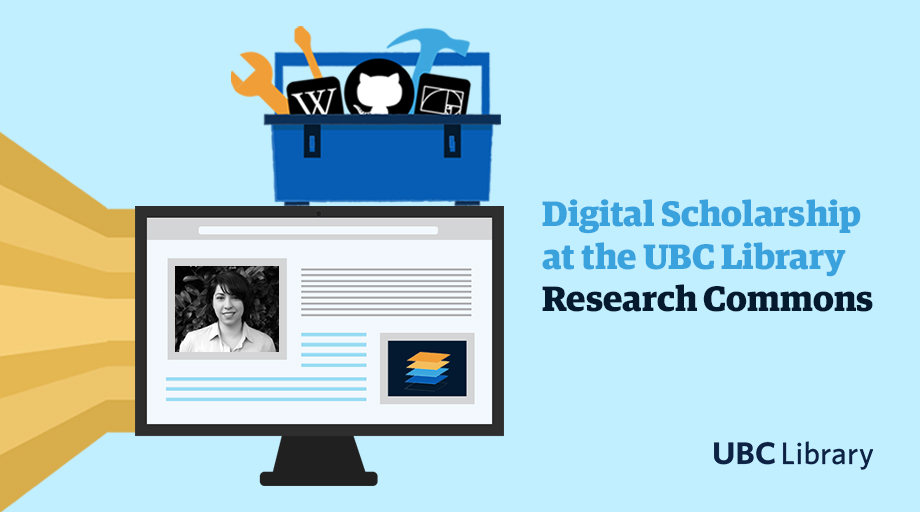
Digital Scholarship at UBC has been undergoing a renaissance, and this change has been a highly collaborative effort involving many different groups on both campuses. The UBC Library Research Commons at Koerner Library is at the forefront, with Digital Scholarship Librarian Ekatarina (Eka) Grgurić contributing to a slew of new workshops and initiatives. Previously the User Experience and Digital Technologies Librarian at McGill University Library, a NC State University (NCSU) Libraries fellow, and a UBC iSchool alumna, Grgurić has set a rapid pace to collaborate with established campus partners and build out the digital scholarship programming since joining the Research Commons team in 2019.
“My goal is to empower people. I did a listening tour to get a sense of what was out there,” says Grgurić, recounting her early days in the role, when she set out to define digital scholarship in a local context at UBC. One of the first gaps she addressed was the inconsistent access to support for students and faculty in some disciplines who wanted to upskill—develop a foundational skill set—using digital scholarship methods and tools.
With the explosive growth of digital scholarship tools, it has become easier in many ways for researchers to introduce digital tools into traditional workflows, but there are many who don’t know where to start. In response, the Research Commons now offers a robust set of workshops that focus on Core Skills like web scraping, creating a Git repository, or using APIs. Over the summer, the Research Commons also launched a six-part GIScience series, funded as a small Teaching and Learning Enhancement Fund (TLEF) Innovation Project. The workshops, which booked up quickly, introduced participants to technologies relevant to geographic information systems, a skill set that has become increasingly popular among UBC students in many different disciplines.

Ekatarina Grgurić, Digital Scholarship Librarian at the UBC Library Research Commons.
“We have a workshop template that deviates from the standard. All our workshops are available on GitHub, and built simply so that anyone can download and remix them. We are working on making sure all our workshop content has open copyright licenses to enable greater reuse,“ says Grgurić, noting that the workflow developed first for the Core Skills series and then the GIScience series has been a valuable model going forward and a way to provide much needed Open Educational Resources (OERs), particularly in light of the current need for remote learning materials. “The biggest impact of these OERs is that they’re computationally reproducible and easy to open on many different systems. We impose no barriers on the students who want to work with them. We’ve also successfully leveraged the GitHub infrastructure to do meaningful review of content and are developing best practices around this. The pivot to online instruction was all that much easier because we had this in play.”
In September, the Research Commons debuted two new workshop series in collaboration with UBC Okanagan Library and other partners: the Digital Toolkit series and the Research Data Management series. Other notable projects include the recent reinvigoration of Pixellating, a monthly Digital Humanities mixer, which is next set to meet online on Wednesday, October 21 (11am-1pm) with a showcase that will discuss the British Columbia and Canada through Arriving Eyes project. Working with UBC IT, the Research Commons also recently launched remote access to seventeen computers in the Digital Scholarship Lab, which has been closed to the public since March 2020.
With all these projects, the partnerships the Research Commons has developed—and continues to strengthen—with groups like the Public Humanities Hub, UBC Advanced Research Computing (ARC) and others are key to the future of Digital Scholarship at UBC.
Check out all upcoming events and workshops from the Research Commons on the Library calendar or by signing up for their newsletter.
_
The UBC Library Research Commons is a multidisciplinary hub that supports research endeavours and provides training in research-enabling skills. We embrace both new and traditional exploratory scholarship and provide services, software, and expertise. Our services include expertise in digital scholarship, including geospatial and data services; welcoming space for projects and presentations; digital Scholarship Lab with powerful computers, for research, experimentation, collaboration, and work with big data; and consultations and workshops for UBC researchers.
This project is part of UBC Library’s strategic direction to advance research, learning and scholarship.
Learn more about our Strategic Framework.
